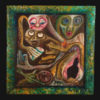In Shintoism, when a Kanushi sought to exorcise a malicious spirit, they would pray not to be made as a Dragon or one of the high celestial Kami. They would pray to be made like the Oni who were low spirits, savage, and their place in the celestial bureaucracy was as punishers of those who wrong the Kami. If they sought to heal, then they would pray to be raised to the level of a Dragon in wisdom.
Prayer was fellowship in Shintoism, not worship, and was a respectful form/protocol. So by observing the proper forms and behaviour, they believed the Kami (which included Dragons) would consider them worthy of assistance and guidance. Otherwise, it was believed that if they could not show proper reverence, the Kami would ignore them as they had other things to do in keeping the order of the world.
Are you saying that Dragons are lowly in wisdom? No. I’m saying they are high in wisdom and the Kanushi sought to share in that height.
Prayer seen as fellowship, joint effort, and in that varying levels of enlightened ones which sort of reflects our variety of same in humans. As they pray to them, they pray to themselves. Yes. This is why in Buddhism they pray for the liberation of all beings, even those of high office and responsibility. Buddhism is not atheistic, but it’s not theistic either. They acknowledge and respect spirits, but see them much as they see humans. In Taoism, we all come from the same Tao. They give the Tao many names. Maybe most encompassing is the Great Mother and all things share in her nature. In Taoism, all things embody her.
The mystic avatars as a rule are those who want to guide humans? No. Avatars as a rule are those who act as agents of the divine, teach or not.
Like those who do channelling? There is another phenomenon related to channelling. It’s situational though. It is believed that the sprits/gods/what have you, can act temporarily not taking a single visible form, but more taking action as a “ghost in the machine”. Coordinating elements and events so their will and intervention is very visible. Thus many mystics have identified specific patterns of events, omens, etc., and not only connect them to the divine but to specific facets of the divine.
I’m not sure why they’d come within a mile of humans unless they were really keen on guiding them, or perhaps the divine puts them there? But I guess when you get to that level the humans aren’t so annoying? There is a passage in the Bible, but I will have to paraphrase. That if there were no humans the rocks would praise God. They come for the greater balance/order which includes humans, but isn’t limited to them and they do come when called.
This is the purpose of opening ritual in Voodoo. They don’t just automatically start ecstatic dance, that comes after the opening, after the evocation. They dance to get out of the way of the Loa. Loa is just an African word for spirits. They know if they lose themselves in dance, the Loa will find them and use them as they have been invited to do. They don’t always ask for specific Loa either. Sometimes they deliberately leave that open. The reason being they believe the Loa who have been lingering in the community will surface in the dance, and then they will be able to ask them what they are doing and why, and maybe negotiate peace with that Loa if they are unhappy.
Example. To Voodoo thinking, if Baron Smaedi has been offended, people in the community will get very sick. If he stays offended, there will be a lot of deaths. So if there is evidence of that, they have a dance and hope he will talk to them.
Your thoughts are welcome. Be well friends.
Travis Saunders
Dragon Intuitive
~science,mysticism,spirituality~



Leave a Reply